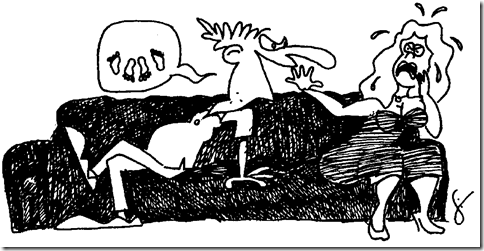"Harassment" perceived as non-threatening isn’t distressing
For women, sexual harassment was distressing when they saw it as frightening, but not when they saw it as bothersome. "We were surprised by this finding," Settles said. "We thought women would be negatively impacted if they saw their harassment as frightening or bothersome."[…]
Study Finds Surprising Gender Differences Related to Sexual Harassment |Science Daily
 Surprise. Open-minded researcher Isis H. Settles from Michigan State University and colleagues get unexpected results that don’t fit the feminist mold.
Surprise. Open-minded researcher Isis H. Settles from Michigan State University and colleagues get unexpected results that don’t fit the feminist mold.
All depends on how the victim perceives the harassment. The enclosed two cartoons depicts how the same harassing behavior can elicit either shock and terror, or, in the second picture, below, mild amusement.
This of course makes us wonder if the feminist hysteria is not self-fulfilling. Women in "macho" cultures, who were never indoctrinated in feminist hysteria and never knew that cat calls or invitation to sex were something frightening, don’t get distressed by such action. So the solution to the harassment problem would be to empower women, not to get frightened easily.
Of course, undue influence using violence or strong coercion is something different. Feminists tend to confound clearly violent illegal criminal rape and harassment with normal or slightly disturbing but non-violent and non-abusive behavior.
 Definition of Harassment
Definition of Harassment
Sexual harassment is defined as unwanted gender-based comments or behaviors (Fitzgerald, 1996) with three subtypes. Gender harassment refers to behaviors that disparage an individual on the basis of her or his gender (e.g., comments that insult women s intelligence; comments regarding behaviors a real man would do). Unwanted sexual attention refers to unwanted touching or attempts to establish a sexual relationship (e.g., repeated requests for dates). Finally, sexual coercion refers to attempts to coerce a sexual relationship in exchange for job-related threats or benefits (e.g., promising a promotion if the target engages in sexual activities). Frightened or Bothered: Two Types of Sexual Harassment Appraisals
Maybe we are ill informed. It seems that mere looks (See Gervais’ "objectifying gaze"), compliments, innuendo, bantering is enough to qualify as sexual harassment.
Great unexpected results! Teasing and "harassing" in non-threatening environment is not frightening. Probably because Dr. Isis Settles’ subjects were not distraught feminist-indoctrinated damsels in college freshmen experiments but empowered women in the armed forces.
In other words: a creepy guy in a deserted forest coming on strong, that is frightening. Or your boss threatening to immediately fire you if you don’t yield to his/her advances. Workplace bantering mostly is not frightening but just bothersome. Like so many things in life. If a person gets frightened by workplace innuendo, then Human-Stupidity suggests to that the problem is in the mind of the perceiver who feels frightened by harmless non-dangerous situations.
Our feminist laws repress men and protect women like defenseless victims
Feminists using manipulative language created a huge legal morass to repress men in all respects, be it harassment, teenage sexuality, so called "child porn" witch hunt, alimony, child support debtor jail, domestic violence craze, rape prosecutions without due legal process, …..
All this is based on the feminist concepts
- of females being poor defenseless victims of male cruelty and
- on the constant confounding of serious crimes with normal behavior or lightly offensive behavior. (see Definition of rape, definition of consent)
Chivalrous men have been suckered into accepting harassment laws in order to protect over-sensitive damsels. Harassment laws severely restrict free speech at the work place (Freedom of Speech and Appellate Review in Workplace Harassment Cases). There have been cases where a man forbidden to have a bikini photo of his wife on his desk. And of course, the beautiful pin-up photos pinned up in car repair stores are a thing of the past, because women would not have the psychological strength to endure the sight of these photos that men used to enjoy.
Harassment is in the eye of the beholder! Harmfulness depends on appraisal by "victim"
Notably, the extent to which sexual harassment is harmful depends, in part, on the way in which the experience is appraised by the target, emphasizing the importance of appraisal processes in this phenomenon.
Frightened or Bothered: Two Types of Sexual Harassment Appraisals
Leave women empowered. Stop feminist dis-empowering education
stop the feminist dis-empowering education that teaches women to appraise harmless pictures, glances and words as dangerous threats! These are self-fulfilling prophecies. Everyone believes that these harmless harassments are hurtful. This is why they end up being hurtful!
Sexual harassment may have become so commonplace for women that they have built up resistance to harassing behavior they consider merely "bothersome," suggests a provocative new study by Michigan State University researchers. Science Daily
Male sexual come-ons have been commonplace in primates for millions of years
Well, psychologists seem to be clueless regarding history and evolution. "Sexual harassment" has not become commonplace. It has always been commonplace.
Maybe the derogatory name "harassment" is new. Maybe even the perception of normal male flirting and come-ons as frightening is new. Latin American women find US-American women’s sensitivities bewildering.
Males have been forcefully pursuing females for millennia, in the EEA, in chimpanzees and other primates, and even in ducks. In other words: the behavior now called "sexual harassment" has been part of life since evolutionary times, for tens of millions of years, and thus we expect women to be perfectly equipped to deal with it.
Truly frightening threats and physical violence are an exception, because there is no evolutionary mental adaptation against superior strength.
More details on evolutionary psychology and sperm competition
There also was a recent article in the press about women having hard-wired inborn rape-avoidance modules.
For women, bothersome appraisals were not found to account for any relationships with distress although frightening appraisals did). Sexual harassment that is perceived to be annoying may be less psychologically distressing for women because of their previous experience with harassing behaviors in other venues; thus women are more likely to have coping mechanisms to deal with such experiences (Salvatore & Shelton, 2007).
Frightened or Bothered: Two Types of Sexual Harassment Appraisals | Abstract
Frightened or Bothered: Two Types of Sexual Harassment Appraisals Full Text
Empower women, don’t punish men
So, the overprotective attitude of the law, seeking to protect women from the minutest stress from "harassment" might actually prevent them from learning to deal with it. Human-Stupidity suggests empowering women to be able women to deal with normal life’s challenges and stresses, instead of more and more restricting and punishing men with the intent to shield women from the slightest discomfort.
I presume, that women in sexually more aggressive Latin and African countries would simply laughingly shrug off come-ons that in the US would constitute grounds for distress, lawsuits and immediate dismissal of the offending male. Unfortunately, repressive US sex attitudes are getting exported to more liberal countries (Women’s Rights Group Plans to Sue Berlusconi for Damages)
Here we have the counter-argument to the feminist "objectifying gaze" research by Dr. Sarah Gervais. Her prize winning research serves to collect munitions for further harassment laws and lawsuits to enforce more stringent rules for male behavior. Human-Stupidity will report on the "objectifying gaze" research shortly.
It is also typical that there is academic feminist research on the dangers of "objectifying gaze" of men, but not about the "disdainful sneer" of women. Men’s constant fear of legal sanctions for saying inappropriate words or illegal gazes creates a hostile unpleasant environment for men. But men don’t whine, don’t band together, don’t defend their liberties and rights.
Frightened or Bothered: Two Types of Sexual Harassment Appraisals Abstract
Frightened or Bothered:Two Types of Sexual Harassment Appraisals
Isis H. Settles, Zaje A. T. Harrell, NiCole T. Buchanan1, and Stevie C. Y. Yap1
Published online before print March 29, 2011, doi: 10.1177/1948550611402520
Social Psychological and Personality Science March 29, 2011 1948550611402520
